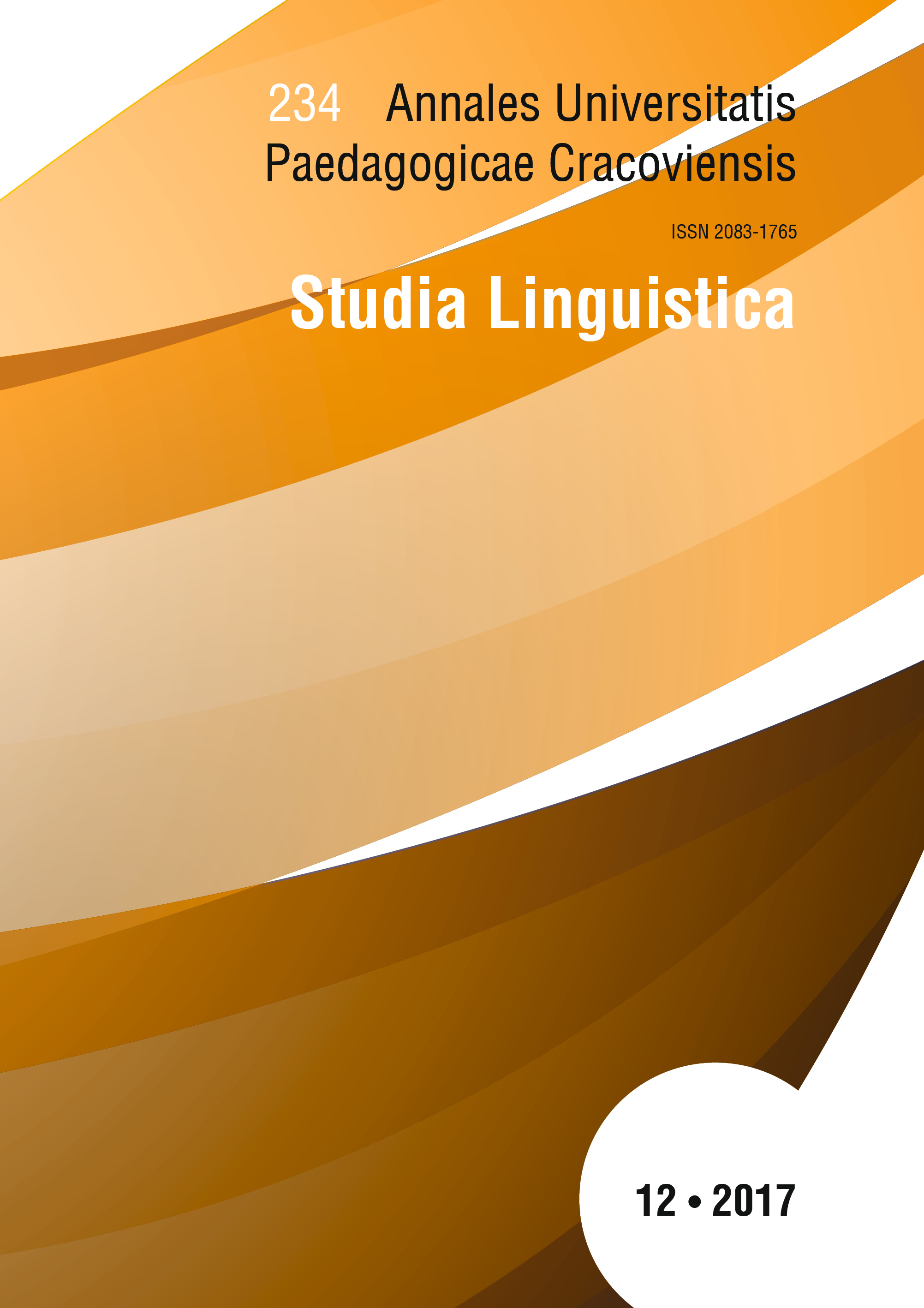Expansive and Recessive Language Families in Europe (and the World) since the Prehistoric Times
Main Article Content
Abstract
The aim or the article is to show the selected tendencies in the development of the linguistic map of the world, undergoing constant change, the result of which is some languages spreading further, while others are not being used anymore (are dying out). In a broader perspective, two opposing processes can be seen in this change - spreading and diminishing (expansion and recession) of the entire language families.
Downloads
Article Details
Author, submitting a text to the editorial board of the journal “Annales Universitatis Paedagogicae Cracoviensis. Studia Linguistica", certifies that the content of the article has not been published so far and that the work does not violate in any way the copyright or related rights of other person, as well as other rights of third parties, and that no one's rights to the work (or any part thereof) have been missed. After signing the contract, the property rights to the published materials are transferred to the University of the National Education Commission, Krakow.
“Annales Universitatis Paedagogicae Cracoviensis. Studia Linguistica” is an open access journal, and all its content is made available free of charge to users and institutions under the Creative Commons CC-BY-NC-ND 4.0 license (attribution, non-commercial use, no derivative works). Under this license, the authors agree that their work may be lawfully reused for any purpose, except for commercial purposes, without the prior consent of the author or publisher. Everyone can read, download, copy, print, distribute and process these works, provided that the author's marking and the original publication place are correct. Published texts may not be used to create derivative works (e.g. to translate and publish in another language without the consent of the publisher). This is in line with the BOAI (Budapest Open Access Initiative) definition. "Studia Linguistica" does not charge for submitting or processing articles.
References
Asher R.E. et al., 1999, The Encyclopedia of Languages and Linguistics, t. I–X, Cambridge.
Google Scholar
Bednarczuk L., 1986, Języki celtyckie, [w:] Języki indoeuropejskie, red. L. Bednarczuk, t. II, Warszawa, s. 645–731.
Google Scholar
Duličenko D., 1981, Slavjanskie literaturnye mikrojazyki. Voprosy formirovanija i razvitija, Tallin.
Google Scholar
Maciejewski W., 1999, Świat języków (Wielka encyklopedia geografii świata), t. XIV, Poznań.
Google Scholar
Majewicz A.F., 1999, Języki wymierające i zagrożone, [w:] W. Maciejewski, Świat języków (Wielka encyklopedia geografii świata), t. XIV, Poznań, s. 95–109.
Google Scholar
Mańczak W., 1986, Języki romańskie, [w:] Języki indoeuropejskie, red. L. Bednarczuk, t. II, Warszawa, s. 571–644.
Google Scholar
Milewski T., 1976, Językoznawstwo, wyd. VI, Warszawa.
Google Scholar
Moseley Ch., Asher R.E., 1994, Atlas of the World’s Languages, London–New York.
Google Scholar
Moszyński L., 1984, Wstęp do filologii słowiańskiej, Warszawa.
Google Scholar
Otwinowska B., 1974, Język – naród – kultura. Antecedencje i motywy renesansowej myśli o języku, Wrocław– Warszawa–Kraków–Gdańsk, s. 160–164.
Google Scholar
Reczek J., 1986, Język nowogrecki, [w:] Języki indoeuropejskie, red. L. Bednarczuk, t. I, Warszawa, s. 449–467.
Google Scholar
Safarewicz J., 1986a, Języki italskie, [w:] Języki indoeuropejskie, red. L. Bednarczuk, t. II, Warszawa, s. 515–570.
Google Scholar
Safarewicz J., 1986b, Język starogrecki, [w:] Języki indoeuropejskie, red. L. Bednarczuk, t. I, Warszawa, s. 397–447.
Google Scholar
Sławski F., 1986, Języki słowiańskie, [w:] Języki indoeuropejskie, red. L. Bednarczuk, t. II, Warszawa, s. 907–1005.
Google Scholar
Szulc A., 1986, Języki germańskie, [w:] Języki indoeuropejskie, red. L. Bednarczuk, t. II, Warszawa, s. 733–816.
Google Scholar
Walczak B., 2006a, Język polski wśród języków świata u progu trzeciego tysiąclecia, „Postscriptum” 2 (52), s. 154–165.
Google Scholar
Walczak B., 2006b, Język czy dialekt – problem lingwistyczny, [w:] Korowód idei i metod. Prace na jubileusz Profesora Czesława P. Dutki i Zakładu Teorii Literatury, red. G. Kubski i M. Mikołajczak, Zielona Góra, s. 23–32.
Google Scholar
Walczak B., 2006c, Mjastoto na slavjanskite ezici sred svetovnite na praga na treteto chiljadoletie, Plovdivski Universitet „Paisij Chilendarski” – „Naučni Trudove”, 44, „Filologia”, s. 18–31.
Google Scholar
Walczak B., 2007, Status etnolektu (problem „język czy dialekt ?”) w polskiej literaturze językoznawczej, [w:] Leksykalno-stylistyczne zjawiska w polszczyźnie ogólnej, red. E. Skorupska-Raczyńska, J. Rychter, Gorzów Wielkopolski, s. 115–124.
Google Scholar
Walczak B., 2010, Migracje jako czynnik kształtujący językową mapę świata, [w:] Obrazy migracji, red. K. Ilski, Poznań, s. 61–67.
Google Scholar
Walczak B., 2011, Języki słowiańskie wśród języków świata dawniej i dziś, „Annales Universitatis Paedagogicae Cracoviensis. Studia Russologica” IV, s. 264–273.
Google Scholar
Weinsberg A., 1983, Językoznawstwo ogólne, Warszawa.
Google Scholar
